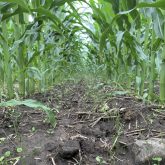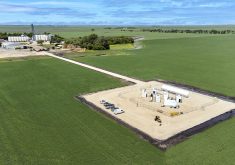Two researchers from the University of Guelph have reached the semifinalist stage of a $2-million competition striving for a more environmentally conscious future of food.
The proposal, submitted by a professor and a PhD student from University of Guelph’s School of the Environmental Sciences, calls for “truly integrative agricultural practices” throughout southwestern Ontario by 2050, including sharing of land use as a way of enhancing the biodiversity of the region’s farmland, and stronger governmental supports for small-scale agricultural enterprises.
Why it matters: Prizes encouraging debate about big ideas can have positive outcomes in communities.
Read Also

Ontario’s agri-food sector sets sights on future with Agri-Food 2050 initiative
The first-ever Agri Food 2050, a one-day industry event dedicated to envisioning the future of food and farming in Ontario,…
The proposal faces tough competition from other projects, including “home farming hubs” in a poverty-stricken township in South Africa, and modernizing small-scale aquaculture in Malaysia.
The Guelph entry is one of almost 76 proposals chosen for the semifinalist stage of the Food System Vision Prize out of 1,300 original entrants.
Ten “Top Visionaries” are expected to be named later this year, each eligible for a $200,000 prize, funded by the Rockefeller Foundation.
There are three other Canadian proposals among the semifinalists: a “regionalized and participatory food system, built on regenerative agriculture, for the bioregion of southwest British Columbia,” from the Institute for Sustainable Food Systems at Vancouver’s Kwantlen Polytechnic University; a vision for agriculture in 2050 in the Treaty 4 territory of the Cree and Saulteaux First Nations, stretching across southern portions of all three Prairie provinces, submitted by the University of Manitoba’s Natural Systems Agriculture Laboratory; and a project of “Regenerative food and health systems” created by Montreal-based non-governmental organization Nourish.
The two researchers leading the University of Guelph’s Food System Vision Prize bid are PhD student René Sahba Shahmohamadloo and Professor Paul Sibley.
They say that food production in southwestern Ontario aims to maximize production through intensification. That’s achieved by the use of fertilizers, pesticides and large-scale farming.
That approach provides a large food supply, but also presents challenges including:
- Managing the environmental footprint of intensive production systems,
- A lack of interest in change in the agriculture community,
- Climate change.
The proposal calls for “the adoption of ‘landscape by design’ which emphasizes a land sharing approach to promote enhanced ecological integrity,” tax incentives for moving away from monoculture-style cropping, a minimum wage of $20 per hour for farm labour, and “educating a new generation of farmers in southwestern Ontario with a greater understanding of climate change.”
According to Shahmohamadloo and Sibley, there is common ground with established farming practices. They believe their proposal positions itself just ahead of the curve.
“More farmers are adopting technologies that increase yields and decrease inputs,” they said by email.
Further refinement of these technologies would be crucial in creating more biodiverse farms, they said.
Foods produced for particular ethnic communities, as cited in their proposal, have also received growing interest among mainstream farm groups.
In other ways, Shahmohamadloo and Sibley agree their assessment of the scale of the threat may differ from established efforts to build sustainability in Ontario agriculture. But “we do not view our vision as competitive with existing programs/visions,” they said.
“Philosophically, what we are proposing is consistent with the goals and objectives of many of these programs.”
Leading into the semifinalist decision by the Rockefeller Foundation, the University of Guelph team expanded on its original application by inviting input from the university’s Arrell Food Institute, the Ecological Farmers Association of Ontario, the Ontario Soil and Crop Improvement Association, the Alternative Land Use Systems (ALUS) organization for Canada, the municipally supported Guelph-Wellington Our Food Future Initiative, the University of Windsor’s Great Lakes Institute for Environmental Research, and the Grey Bruce Centre for Agroecology.
If they’re successful in securing a $200,000 finalist grant, their first step will be organizing a series of workshops for all levels of the province’s agri-food sector, to brainstorm the 2050 vision.
“Initially, this would focus on southwestern Ontario,” they said, “but any common strategy that is developed could, we believe, be readily transferred to any jurisdiction in North America.”















